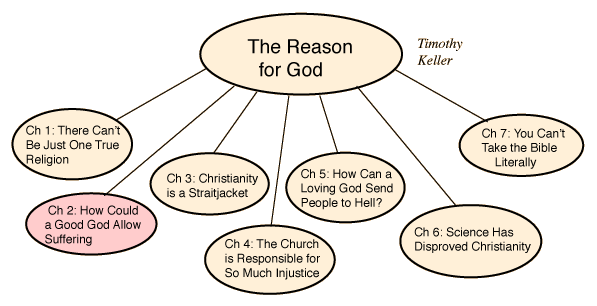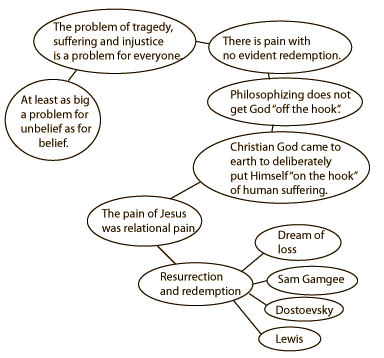The Reason for God
Timothy Keller
Chapter 2: How Could a Good God Allow Suffering?

Scripture References:
2 Corinthians 12:7-10 Paul's thorn in the flesh.
Romans 8:35-39 Nothing can separate us from God's love.
2 Corinthians 4:16-18 Our suffering is temporary, our glory eternal.
Job 14:1 Trouble is a part of life.
James 1:2-3 Our trials build patience.
Psalm 34:19 The Lord will deliver us.
| "I just don't believe the God of Christianity exists," said Hillary, and undergrad English major. "God allows terrible suffering in the world. So he might be either all-powerful but not good enough to end evil and suffering, or else he might be all-good but not powerful enough to end evil and suffering. Either way the all-good, all-powerful God of the Bible couldn't exist." | "This isn't a philosophical issue to me," added Rob, Hillary's boyfriend. "This is personal. I won't believe in a God who allows suffering, even if he, she or it exists. Maybe God exists. Maybe not. But if he does, he can't be trusted." |
| Mackie "If a good and powerful God exists, he would not allow pointless evil, but because there is much unjustifiable, pointless evil in the world, the traditional good and powerful God could not exist. Some other god or no god may exist, but not the traditional God. " Hume classical statement. | Flaw: If evil appears pointless to me, it must be pointless.
Example of Joseph. |
| "Evil and suffering may be (if anything) evidence for God." | C.S. Lewis "My argument against God was that the universe seemed so cruel and unjust. But how had I got this idea of "just" and "unjust"?...What was I comparing this universe with when I called it unjust?...Of course I could have given up my idea of justice by saying it was nothing but a private idea of my own. But if I did that, then my argument against God collapsed too - for the argument depended on saying that the world was really unjust, not simply that it did not happen to please my private fancies ... Consequently atheism turns out to be too simple." Alvin Plantinga "Could there really be any such thing as horrifying wickedness [if there were no God and we just evolved]? I don't see how. There can be such a thing only if there is a way that rational creatures are supposed to live, obliged to live ... A [secular] way of looking at the world has no place for genuine moral obligation of any sort ... and thus no way to say there is such a thing as genuine and appalling wickedness. Accordingly, if you think there really is such a thing as horrifying wickedness (.. and not just and illusion of some sort), then you have a powerful ... argument [for the reality of God.] |
 |
|
|
In our discussion, it was pointed out that the above deals particularly with suffering that has no apparent purpose. There are other forms of suffering that we as Christians deal with which we might also fruitfully discuss:
|
Flaw: If evil appears pointless to me, it must be pointless.
"Tucked away within the assertion that the world is filled with pointless evil is a hidden premise, namely, that if evil appears pointless to me, then it must be pointless. ..Just because you can't see or imagine a good reason why God might allow something to happen doesn't mean there can't be one. Again we see lurking within supposedly hard-nosed skepticism an enormous faith in one's own cognitive faculties. If our minds can't plumb the depths of the universe for good answers to suffering, well, then, there can't be any! This is blind faith of a high order."
St. Bernards and No-seeums
Christian philosopher Alvin Plantinga provides an illustration to address the above flaw in reasoning. "If you look into your pup-tent for a St. Bernard, and you don't see one, it is reasonable to assume that there is no St. Bernard in your tent. But if you look into your pup tent for a 'no-see-um' (an extremely small insect with a bite out of all proportion to its size) and you don't see any, it is not reasonable to assume that they are not there. Because, after all, no one can see 'em. Many assume that if there were good reasons for the existence of evil, they would be accessible to our minds, more like St. Bernards than like no-see-ums, but why should that be the case?"
Example of Joseph.
"Joseph was an arrogant young man who was hated by his brothers. In their anger at him, they imprisoned him in a pit and then sold him into a life of slavery and misery in Egypt. Doubtless Joseph prayed to God to help him escape, but no help was forthcoming, and into slavery he went. Though he experienced years of bondage and misery, Joseph's character was refined and strengthened by his trials. Eventually he rose up to become a prime minister of Egypt who saved thousands of lives and even his own family from starvation. If God had not allowed Joseph's years of suffering, he never would have been such a powerful agent for social justice and spiritual healing."
Growth in suffering.
Doubt: Typically stated that the world is full of pointless evil.
- But the hidden assumption is that if it appears pointless to me, then it must be pointless.
- Note the faith the skeptic has in his/her own cognitive insights!
So how do we understand the many who admit that their most important lessons came through suffering?
- SO - if God is great and transcendent enough to be mad at because he hasn't stopped evil and suffering, then you at that very same moment have a God great and transcendent enough to have reasons for allowing suffering that you cannot know. You can't have both!
- And when you say the world is unjust, you have to ask where your concept of justice came from.
- Without God to provide this perspective, evil would simply be natural [And natural's good, isn't it?]
But there's another dimension to the suffering issue - Jesus.
The Christian God came to earth to put Himself on the hook of human suffering. Ever wonder how martyrs across history went to their deaths with less seeming agony than Jesus in Gethsemane?
- Jesus bore the endless exclusion from God that the human race merited.
- Experiencing the inferno of abandonment, he still cries out in the language of intimacy "My God, My God."
So why does God allow evil and suffering?
- We may not know what the answer is, BUT We know what it is not.
- It can't be that He doesn't love us.
- It can't be that he is detached or unconcerned about our condition.
- He took it on Himself.
And as for hope that suffering is not "in vain" - we have the resurrection.
- The Biblical view of the resurrection is not one of escape or consolation.
- It is a view of restoration.
- Everything will be not only be undone and repaired, but will make the eventual glory and joy even greater.
- At the end of Lord of the Rings, Sam Gamgee, discovering Gandalf was not dead asks: "Is everything sad going to come untrue?"
- And the Christian answer is YES, YES, YES!
- In conclusion on the topic of evil and suffering . . .
| "This is the ultimate defeat of evil and suffering. It will not only be ended but so radically vanquished that what has happened will only serve to make our future life and joy infinitely greater." (Keller p. 34) |
| Quotes and comments |
| Reading Reference |
| Faithpath | R Nave |